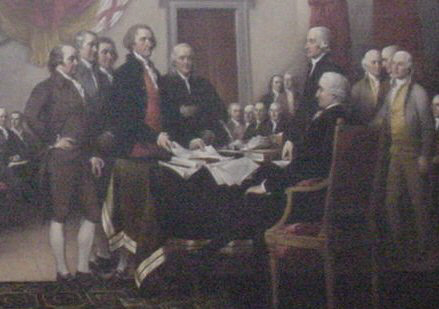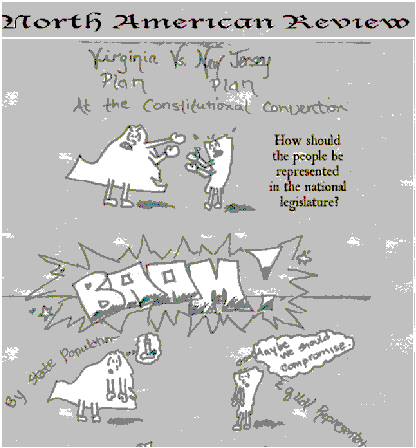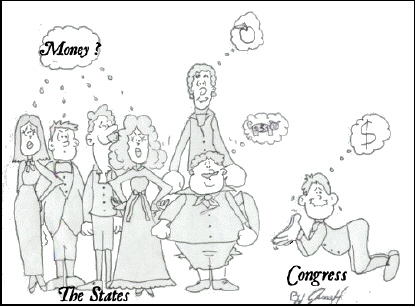Multiple Choice
Identify the
letter of the choice that best completes the statement or answers the question.
|
|
|
1.
|
The Declaration of Independence states that among our inalienable rights are
a. | freedom of Religion | c. | the right to private property | b. | “Life,
Liberty, and the pursuit of Happiness” | d. | independence from
Tyranny |
|
|
|
2.
|
Which term from the preamble of the Constitution refers to the idea of popular
sovereignty?
a. | We the People | c. | Promote the general welfare | b. | For ourselves and
our posterity | d. | Establish
justice |
|
|
|
3.
|
What is the term for a detailed, written plan of government?
a. | confederation | c. | bicameral | b. | constitution | d. | compact |
|
|
|
4.
|
The first 10 amendments to the Constitution are known as the
a. | Articles of Confederation. | c. | Constitutional
Convention. | b. | Great Compromise. | d. | Bill of Rights. |
|
|
|
5.
|
Which agreement satisfied both the large states and samall states by
establishing a Congress that would have a Senate with equal representation and a House of
Representatives with membership based on population?
a. | Three-Fifths Compromise | c. | Great
Compromise | b. | Articles of Confederation | d. | New Jersey Plan |
|
|
|
6.
|
Which document created a stonger central American government with powers to put
down rebellions, raise armies, and tax the states to provide services.
a. | The Declaration of Independence | c. | The English Bill of
Rights | b. | The US Constitution | d. | The Articles of Confederation |
|
|
|
7.
|
Which document guaranteed that not even the king was above the law by making
sure the monarch would follow the charter that he signed?
a. | Constitution | c. | Magna Carta | b. | Mayflower Compact | d. | House of
Burgesses |
|
|
|
8.
|
The Virginia Statute of Religious Freedom was every important in the development
of which other important written document?
a. | the Mayflower Compact | c. | The Gettysburg Address | b. | The Virginia
Declaration of Rights | d. | The
First Amendment |
|
|
|
9.
|
The form of government, illustrated below, has power divided and shared between
the national government and the states? a. | Federalism. | c. | Confederation. | b. | Patriotism. | d. | Anti-federalism. |
|
|
|
10.
|
In the image, we see Thomas Jefferson, John Adams, and Benjamin Franklin
presenting a certain document to John Hancock, the president of the Continental Congress. Which
document is he presenting to the President for his signature?  a. | The Magna Carta | c. | The US Constitution | b. | The Great Compromise | d. | The Declaration of
Independence |
|
|
|
11.
|
From which part of the Declaration of Independence
is the following section taken?
We hold these Truths to be self-evident, that all Men are
created equal, that they are endowed by their Creator with certain unalienable Rights, that among
these are Life, Liberty and the Pursuit of Happiness.
a. | The Statement of Natural Rights | c. | The Statement of Political
Separation | b. | The Crimes of the King | d. | The Preamble |
|
|
|
12.
|
When colonists decided to refuse to buy British goods, Parliament repealed the
Stamp Act. What is another word for this form of protest?
a. | steal | c. | destroy | b. | blockade | d. | boycott |
|
|
|
13.
|
The ____ was the first constitution of the United States of America.
a. | United States Constitution | c. | Articles of
Confederation | b. | Mayflower Compact | d. | Declaration of Independence |
|
|
|
14.
|
Which event is being shown in the image below:  a. | Writing the Bill of Rights | c. | Writing the Declaration of
Independence | b. | The Great Compromise | d. | Signing the Treaty of Paris in 1783. |
|
|
|
15.
|
Which document of American history acted as a major source for Jefferson as he
wrote the Declaration of Independence?
a. | The Northwest Ordinance (1786) | c. | The Virginia Statute of Religious
Freedom (1786) | b. | The US Bill of Rights (1791) | d. | The Virginia Declaration of Rights
(1776) |
|
|
|
16.
|
What part of the Constitution deals with how the legislative branch will
work?
a. | Article I | c. | the First Amendment | b. | Preamble | d. | Bill of Rights |
|
|
|
17.
|
Which branch of government took the form of a bicameral lawmaking body once the
US Constitution was written?
a. | Judicial | c. | Legislative. | b. | Federal | d. | Executive. |
|
|
|
18.
|
What event marked the beginning of self-government in colonial America?
a. | the Boston Tea Party | c. | the First Continental Congress | b. | the signing of the
Mayflower Compact | d. | King
George signs the Magna Carta |
|
|
|
19.
|
Which of the following ideas is the notion that governmental power lies with the
people, who can make decisions on major issues through the democratic process?
a. | Separation of powers | c. | Consent of the Governed | b. | Federalism | d. | The rule of law |
|
|
|
20.
|
From which 1776 document would this excerpt most
likely be taken?
XIV That the people have a right to uniform government; and therefore, that no
government separate from, or independent of, the government of Virginia, ought to be erected or
established within the limits thereof.
a. | The US Constitution | c. | The Virginia Declaration of Rights. | b. | The Articles of
Confederation. | d. | The
Declaration of Independence |
|
|
|
21.
|
Which idea is NOT a true statement about the Declaration of
Independence?
a. | It stated that “The Colonies ought to be considered free and independent
states.” | c. | The Declaration is a plan of government for the US. | b. | It contains the idea
that all humans have ceratin basic rights that cannot be taken away. | d. | It states that all people are created equal in
the sight of their Creator |
|
|
|
22.
|
Which historical document, important in the establishment of Virginia as a
colony, is described below:
We would
vouchsafe unto them our License, to make Habitation, Plantation, and to deduce a colony of sundry of
our people into that part of America commonly called VIRGINIA, and other parts and Territories in
America,
We would vouchsafe unto them our License, to make Habitation, Plantation, and to deduce a
colony of sundry of our people into that part of America commonly called VIRGINIA, and other parts
and Territories in America...
a. | The Virginia Plan | c. | The Charter of Freedom | b. | The Great
Charter | d. | The First Virginia
Charter |
|
|
|
23.
|
The Boston Tea Party caused Parliament to pass the Coercive Acts, which
Americans called the
a. | Intolerable Acts. | c. | Townshend Acts. | b. | Tea Acts. | d. | Declaratory
Acts. |
|
|
|
24.
|
Which form of government is made up of elected leaders rather than an inherited
king or queen?
a. | Monarchy | c. | Dictatorship | b. | Totalitarian | d. | Republic |
|
|
|
25.
|
Who led an armed uprising of about 1,200 Massachusetts farmers in 1786, which
led to the strengthening of the central government through the revision of the Articles of
Confederation?
a. | John Locke | c. | George Washington | b. | Thomas Paine | d. | Daniel Shays |
|
|
|
26.
|
Which group opposed the Constitution because a bill of rights was missing,
thereby lacking way to provide protection for certain basic liberties?
a. | Whigs | c. | Liberals | b. | Abolitionists | d. | Anti-Federalists |
|
|
|
27.
|
Which historical document reads...
III. The
said States hereby severally enter into a firm league of friendship with each other, for their common
defense, the security of their liberties, and their mutual and general welfare, binding themselves to
assist each other...
a. | The Articles of Confederation | c. | The Mayflower
Compact | b. | The English Bill of Rights | d. | The US Constitution |
|
|
|
28.
|
When Jefferson complained that King George was guilty of “imposing Taxes on us without our Consent,“ to which concept of
democracy was he referring?
a. | Innocent Until Proven Guilty. | c. | Equality in
Society. | b. | Rule of Law. | d. | Consent of the Governed. |
|
Matching
|
|
|
a. | The Magna Carta | d. | The Articles of Confederation | b. | The Virginia Statute
of Religious Liberty | e. | The
Mayflower Compact | c. | The US
Constitution |
|
|
|
29.
|
Clause 18: Congress shall have the power to
make all Laws which shall be necessary and proper for carrying into Execution the foregoing Powers,
and all other Powers vested by this Constitution in the Government of the United States, or in
any Department or Officer thereof.
|
|
|
30.
|
Which document is symbolized by the editorial
cartoon shown below?

|
|
|
31.
|
Be it enacted by the General Assembly, That no man
shall be compelled to frequent or support any religious worship, place, or ministry
whatsoever... nor shall otherwise suffer on account of his religious opinions or belief; but that all
men shall be free to profess... their opinion in matters of religion....
|
|
|
32.
|
In Witness whereof we have hereunto subscribed our
names at Cape Cod the eleventh of November, in the Reign of our Sovereign Lord, King James of
England, France and Ireland, the eighteenth, and of Scotland the fifty-fourth. Anno Domini,
1620."
|
|
|
33.
|
Both we and the barons have sworn that all
this shall be observed in good faith and without deceit. Witness the abovementioned people and many
others.
Given by our hand in the meadow that is called Runnymede, between Windsor and Staines, on
the fifteenth day of June in the seventeenth year of our reign (i.e. 1215: the new regnal year
began on 28 May).
|
Short Answer
|
|
|
34.
|
Extra credit:
Which historical event is depicted in the image
below?
|